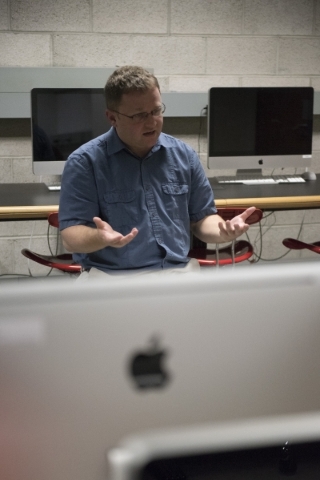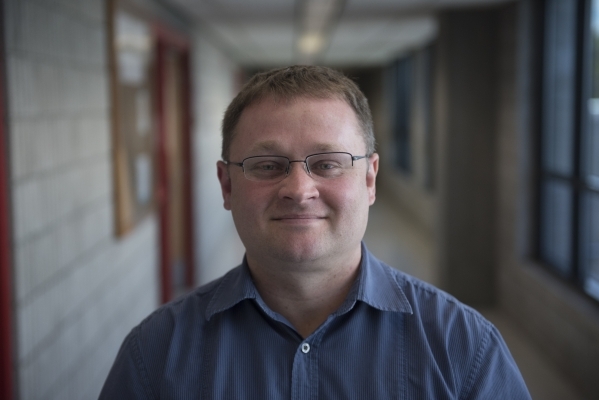His work opens computer science to the blind
Andreas Stefik never really considered himself an agent for change.
He simply saw a need in the blind community — which didn't have the resources to work in computer science because of the lack of compatible software — and acted.
But after 10 years of developing his program, Stefik was recognized by the White House as a Champion of Change.
The UNLV computer science professor traveled to the snow-covered city in January along with eight people from various walks of life to accept the award.
"It was a surreal experience," Stefik says. "I feel almost unworthy to be recognized along such amazing people who I don't hold a candle to."
The acknowledgement was for his technological advancement that has made it easier for people who are visually impaired to use computer software.
He says it opens up doors for the community, which struggles with unemployment at higher rates than the general public.
He received grants from the National Science Foundation to help him establish an educational infrastructure for blind and visually impaired students who are interested in learning computer science.
Additionally, he is looking into conducting more research to challenge current academic findings on the subject, which he says has been proven to be mostly inaccurate.
Stefik developed a programming language known as Quorum that is specific to visually impaired people.
Stefik's journey into computer science and developing this software actually started while he was a musician. He had a few technical problems that got him interested in linear algebra. Before he knew it, he was finishing a bachelor's degree in math.
Going into graduate school, he studied computer science. It was during that time he started looking at computer programing for the blind community.
Working alongside his professor, he found that those in the blind community who wanted to get involved with programming didn't have many options or resources.
Aside from developing his program, Stefik has been teaching at UNLV four years. Now, he gets to watch groups of young and eager students brainstorm and develop ideas just like he did.
Stefik did not realize the White House was considering his nomination for a Champion of Change award. In December, he received an email from the White House.
"I honestly thought it was spam," he says.
After signing into several secure Web pages, he determined it wasn't a hoax. The White House was reaching out to him for some unclear reason. When he finally was able to talk to someone, he found out about the acknowledgement.
"It seemed a little surreal," he says.
After hours of being delayed because of weather, a detour to North Carolina, a failed attempt to take Amtrak and a rushed car ride to Washington, D.C., Stefik made his way to the White House on Jan. 26.
Because of the snowstorm on the East Coast, some of the usual festivities for the Champion of Change ceremony were canceled. In its place, Obama Administration cabinet members came in to meet and listen to the recipients discuss ideas on various issues.
Stefik was able to talk about the efforts to make computer science programs more accessible to elementary, middle and high school students.
He also found out who nominated him for the award — Clayton Lewis, a professor of computer science at the University of Colorado, Boulder.
Lewis and Stefik met at several conferences.
"We have various interests that overlap," Lewis says.
Lewis' admiration of Stefik grew as he learned more and more about his efforts to make programming for the blind.
"I heard through a former colleague who works in the federal government about the nomination," Lewis says. "I thought Andy was a good choice."
Often when he has submitted people's names for awards and acknowledgements, he doesn't hear back.
"I was thrilled to hear Andy was selected for this," he says. "I'm glad they recognized and shared my admiration for him."
In his classes, Stefik stays humble and focuses on the next generation of computer scientists.
When given the chance, he makes sure to tell his students about how technology can create change.
"I try not to push students," he says. "Some just want to build something. My job is to just keep them cognizant of what they could do with technology."
Contact reporter Michael Lyle at mlyle@reviewjournal.com or 702-387-5201. Follow @mjlyle on Twitter.






























